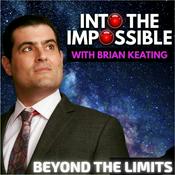Please join my mailing list here 👉 https://briankeating.com/yt to win a meteorite 💥
Code. It's the closest thing humans have ever invented to magic. Write symbols on a screen, and reality emerges. Money moves, doors unlock, planes land, diseases get diagnosed, and most of us have no idea how it actually works. Today's conversation is about why code feels magical and why that feeling is both powerful and also dangerous. In a moment, you'll hear why the real risk of code is artificial intelligence. It's scale. Tiny ideas multiplied across billions of lives.
My guest is Sam Arbesman, complexity scientist and author of The Magic of Code, a book about how software quietly became the most influential force shaping modern civilization. magic and sorcery. Often in our stories, they require a great deal of effort, like training. And so, like, you have to go to Hogwarts for seven years to really know magic and wizardry very well. The same kind of thing is true with code like so let's go cast some spells and learn the magic of code. Let's go.
KEY TAKEAWAYS
00:00 — Code feels magical because text can change reality.
00:25 — The real risk of code is scale, not intelligence.
01:55 — Software shapes modern civilization more than we realize.
02:40 — Coding is both technical and a humanistic liberal art.
03:05 — Code fulfills an ancient desire to control the world with language.
04:15 — Most “new” tech ideas have deep historical roots.
07:00 — Universal computation emerges from conditional logic and loops.
09:10 — Biological computation works very differently from digital computers.
10:30 — Biology expands the definition of computation itself.
12:00 — Software is powerful but inherently temporary.
16:00 — Code resembles magic because it requires long training to master.
17:45 — Software creation is becoming accessible to everyone.
19:40 — Not all software must scale; personal tools matter.
24:10 — Computers are tools, not ends in themselves.
26:35 — Bugs are inevitable and often educational.
56:00 -- The Half Life Of Facts
-
Additional resources:
Get Sam’s Book “The Magic of Code”: https://bit.ly/4qLBnXX
Get My NEW Book: Focus Like a Nobel Prize Winner: https://www.amazon.com/dp/B0FN8DH6SX?ref_=pe_93986420_775043100
-
Join this channel to get access to perks like monthly Office Hours:
https://www.youtube.com/channel/UCmXH_moPhfkqCk6S3b9RWuw/join
📚 Get a copy of my books:
Think Like a Nobel Prize Winner, with life changing interviews with 9 Nobel Prizewinners: https://a.co/d/03ezQFu
My tell-all cosmic memoir Losing the Nobel Prize: http://amzn.to/2sa5UpA
The first-ever audiobook from Galileo: Dialogue Concerning the Two Chief World Systems: Ptolemaic and Copernican https://a.co/d/iZPi9Un
📺 Watch my most popular videos:📺
Neil Turok https://www.youtube.com/watch?v=Dt5cFLN65fI
Frank Wilczek https://youtu.be/3z8RqKMQHe0?sub_confirmation=1
Eric Weinstein vs. Stephen Wolfram https://www.youtube.com/watch?v=OI0AZ4Y4Ip4?sub_confirmation=1
Sir Roger Penrose: https://youtu.be/AMuqyAvX7Wo
Sabine Hossenfelder: https://youtu.be/g00ilS6tBvs
Avi Loeb: https://youtu.be/N9lUceHsLRw
Follow me to ask questions of my guests:
🏄♂️ Twitter: https://twitter.com/DrBrianKeating
🔔 Subscribe https://www.youtube.com/DrBrianKeating?sub_confirmation=1
📝 Join my mailing list; just click here http://briankeating.com/list
✍️ Detailed Blog posts here: https://briankeating.com/blog
🎙️ Listen on audio-only platforms: https://briankeating.com/podcast
#universe #podcast #briankeating #intotheimpossible #science #astronomy #cosmology #cosmicmicrowavebackground #intotheimpossible #briankeating #SamArbesman
Learn more about your ad choices. Visit megaphone.fm/adchoices



